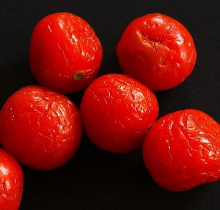
The European Patent Office (EPO) has backed a controversial patent on the “wrinkled tomato” derived from classical breeding processes: On Tuesday, the Technical Board of Appeal confirmed patent EP1211926, granted to the Ministry of Agriculture of Israel already in 2003, with only minor changes to the wording. The patent covers a tomato that has a reduced water content and is thus better suited to the production of ketchup. According to the patent claim, the “tomato fruit is characterised by a capability of natural dehydration while on a tomato plant”. After the tomato is ripe, its skin starts wrinkling but the fruit is usually not affected by microbial spoilage. In 2004, Unilever filed an opposition on the grounds that the patent did not fulfil patentability requirements since the the tomato was obtained with conventional methods which are not patentable. Article 53 (b) of the European Patent Convention prohibits patents on plant varieties as well as on “essentially biological processes for breeding”, which do not involve genetic engineering. However, the EPO is continuing to grant patents on conventionally bred plants, bypassing existing prohibitions with its interpretation of the law. In 2015, for example, Swiss agrochemical giant Syngenta was granted a patent on a seedless pepper derived from conventional breeding as well as on a tomato with a higher content of compounds called flavonols which are known for their health benefits. EPO’s patent granting on conventionally bred plants is heavily criticised. Non-governmental organisations warn that food production is becoming increasingly dependent on just a few big international companies such as Monsanto, Syngenta and Dupont, that file more and more patents on food plants. Nevertheless, EPO’s Enlarged Board of Appeal ruled in March 2015 in a long-awaited decision on the precedent cases of broccoli and tomato, that plants obtained by essentially biological processes are patentable. “It is now up to politicians to show they can succeed in the fight against the well-organised interests of the patent business”, said Christoph Then for the international coalition “No Patents on Seeds!”, which is backed by hundreds of organisations. “The EPO, the patent attorneys and big corporations are all benefitting from these patents, but the negative consequences concern society as a whole.” In a report published on Monday, the coalitions presents political measures that should be taken to prevent patents on plants from conventional breeding. “Around 120 such patents have already been granted. These patents are on the plant characteristics of around 1000 vegetable varieties,” warns Ruth Tippe, who co-authored the report. The scope of many of these patents often covers the whole food chain from production to consumption. (ab)
